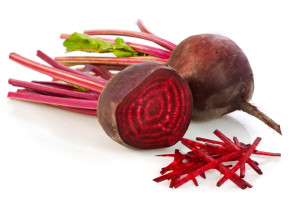Contents
Uses
- Despite traditional use of beetroot for antitumor, carminative, emmenagogue, and hemostatic properties, clinical trials are lacking to substantiate these claims. Data suggest a role as an antioxidant, as a natural source of nitrites, and a potential use in cardiovascular conditions, although evidence is limited. In the food industry, beetroot is used for its color.
Benefits
Consuming fruits and vegetables of all kinds has long been associated with a reduced risk of many lifestyle-related health conditions. Many studies have suggested that increasing consumption of plant foods like beetroot decreases the risk of obesity and overall mortality, diabetes, heart disease and promotes a healthy complexion and hair, increased energy, overall lower weight.
Heart health and blood pressure: A 2008 study published in Hypertension examined the effects of ingesting 500mls of beetroot juice in healthy volunteers and found that blood pressure was significantly lowered after ingestion. Researchers hypothesized this was likely due to the high nitrate levels contained in beet juice and that the high nitrate vegetables could prove to be a low cost and effective way to treat cardiovascular conditions and blood pressure.
Another study conducted in 2010 found similar results that drinking beetroot juice lowered blood pressure considerably on a dose-dependent basis.
Dementia: Researchers at Wake Forest University have found that drinking juice from beetroot can improve oxygenation to the brain, slowing the progression of dementia in older adults. According to Daniel Kim-Shapiro, director of Wake Forest’s Translational Science Center, blood flow to certain areas of the brain decrease with age and leads to a decline in cognition and possible dementia. Consuming beetroot juice as part of a high nitrate diet can improve the blood flow and oxygenation to these areas that are lacking.
Diabetes: Beets contain an antioxidant known as alpha-lipoic acid, which has been shown to lower glucose levels, increase insulin sensitivity and prevent oxidative stress-induced changes in patients with diabetes. Studies on alpha-lipoic acid have also shown decreases in peripheral neuropathy and/or autonomic neuropathy in diabetics.5
Digestion and regularity: Because of its high fiber content, beetroot helps to prevent constipation and promote regularity for a healthy digestive tract.
Inflammation: Choline is a very important and versatile nutrient in beetroot that helps with sleep, muscle movement, learning and memory. Choline also helps to maintain the structure of cellular membranes, aids in the transmission of nerve impulses, assists in the absorption of fat and reduces chronic inflammation.
Exercise and athletic performance: Beetroot juice supplementation has been shown to improve muscle oxygenation during exercise, suggesting that increased dietary nitrate intake has the potential to enhance exercise tolerance during long-term endurance exercise. Quality of life for those with cardiovascular, respiratory, or metabolic diseases, who find the activities of daily living physically difficult because of lack of oxygenation, could be improved.
Beetroot juice improved performance by 2.8% (11 seconds) in a 4-km bicycle time trial and by 2.7% (45 seconds) in 16.1-km time trial.
Cautions
- Cross-sensitivity to sticky weed ( Parietaria ) and beet has been recorded. Beeturia (red urine after eating beetroot) is found in approximately 15% of the population, and coloration of the blood has also been documented (with no apparent consequence).
Interactions
- None well documented
Other names
n/a
References
Source: Drugs.com, http://www.drugs.com/npp/beetroot.html
Medical News Today, http://www.medicalnewstoday.com/articles/277432.php

